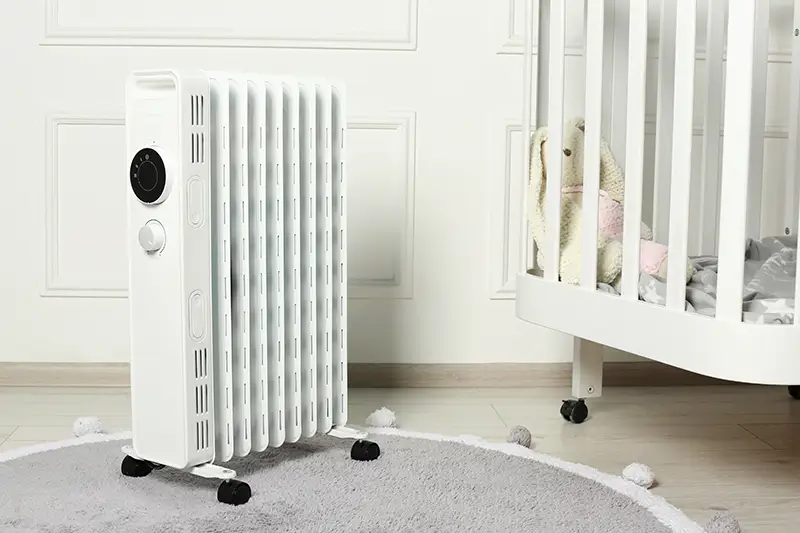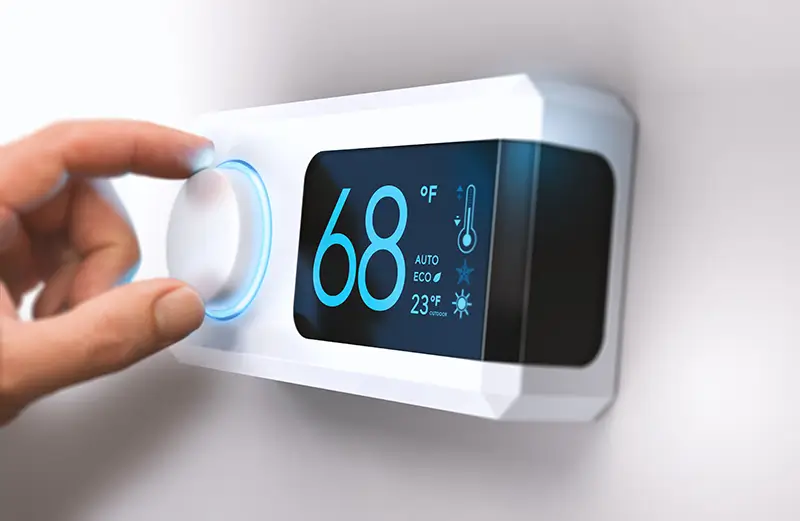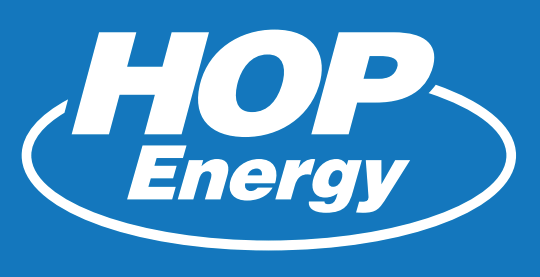Efficient use of home heating oil is not just about cost savings; it’s a commitment to minimizing environmental impact. As energy prices fluctuate and environmental awareness grows, optimizing heating oil use becomes crucial for personal finances and ecological sustainability. This guide dives into practical strategies and technological advancements that empower homeowners to achieve greater heating efficiency. Through understanding oil heater mechanics, exploring the evolution of oil furnaces, and implementing tips for conservation and smart fuel management, readers will learn how to enhance their heating system’s performance, reduce fuel consumption, and enjoy a warm home more sustainably.
Table of Contents
How Efficient Are Oil Heaters?
Oil heaters, central to the heating systems of many homes, have undergone significant efficiency improvements. The key to understanding an oil heater’s efficiency is its Annual Fuel Utilization Efficiency (AFUE) rating. This rating measures the percentage of fuel converted into usable heat, with modern oil heaters achieving AFUE ratings upwards of 86%. Such efficiency is a leap from older models, which hovered around 60-70%, significantly reducing wasted fuel and emissions.
The efficiency of oil heaters is pivotal for two main reasons. First, a higher AFUE rating means more heating oil directly contributes to warming your home, leading to lower fuel consumption and heating costs. Second, efficient fuel use translates to reduced carbon emissions, aligning with environmental sustainability goals. Through technological advancements, including better burner designs and improved heat exchangers, today’s oil heaters offer a balance of performance and environmental responsibility, making them a viable option for efficient home heating.
Evolution of Oil Furnaces
The shift from low to high-efficiency oil furnaces marks a significant advancement in home heating technology. Traditional furnaces, with AFUE ratings below 78%, have largely been phased out, driven by environmental regulations, technological innovations, and consumer demand for more cost-effective and sustainable heating solutions.
High-Efficiency Furnaces:
Definition: High-efficiency oil furnaces boast AFUE ratings of 90% or above, indicating that at least 90% of the fuel is converted into heat for the home.
How They Work: These furnaces utilize advanced technologies to maximize fuel efficiency. Improved heat exchange technology ensures minimal heat is lost in the exhaust, while variable speed blowers adjust airflow to meet heating demands without wasting energy. Electronic ignition systems replace traditional pilot lights, reducing fuel consumption by ensuring the furnace operates only when necessary.
The transition to high-efficiency furnaces responds to the need for more environmentally friendly and cost-efficient heating options. By incorporating sophisticated technology, these furnaces lower household energy costs and contribute to reducing the carbon footprint of home heating. This evolution underscores the industry’s commitment to innovation and environmental stewardship, offering homeowners efficient, reliable, and sustainable heating solutions.
Efficiency of New Oil Furnaces
New oil furnaces stand out for their remarkable efficiency improvements compared to older models. The core of these advancements lies in their design and technology, which have been refined to ensure optimal fuel utilization and minimal environmental impact.
Technological Improvements:
New oil furnaces are equipped with state-of-the-art burners that provide finer atomization of heating oil, leading to more complete combustion. This means more heat is generated from the same amount of fuel.
Secondary heat exchangers have become common, capturing heat from exhaust gases that would otherwise be lost, further improving efficiency.
Smart thermostats and electronic controls optimize furnace operation, adjusting the burn rate and airflow to precisely match the home’s heating needs, avoiding unnecessary fuel consumption.
Comparative Analysis:
Compared to older models, which might have had AFUE ratings around 60-70%, new oil furnaces often achieve 90% or higher ratings. This improvement signifies that a more significant portion of the heating oil is directly converted into usable heat, with very little going to waste.
Such efficiency results in lower heating costs and significantly reduce the carbon emissions associated with home heating, which aligns with growing environmental concerns.
The efficiency of new oil furnaces demonstrates a leap forward in heating technology, offering homeowners an effective way to reduce their energy use and environmental footprint while maintaining comfort during the colder months.

Maximizing Efficiency with Oil Heaters
To fully capitalize on the advancements of modern oil heaters, homeowners can adopt several strategies to enhance efficiency, conserve oil, and save on heating costs:
Efficient Use Practices:
Regular Maintenance: Having your oil heater professionally serviced annually can significantly improve its efficiency. This includes cleaning the burner, checking for leaks, and replacing filters. A well-maintained system operates more efficiently, using less fuel and reducing costs.
Programmable Thermostats: Installing a programmable thermostat allows for precise control over heating, ensuring the system is active only when needed. Setting lower temperatures when the house is empty or everyone is asleep can lead to substantial fuel savings.
Conserving Oil:
Insulation: Upgrading insulation in your home’s attic, walls, and floors keeps the heat inside, reducing the demand for your heating system. Effective insulation can drastically lower heating oil consumption.
Sealing Leaks: Identifying and sealing drafts around doors, windows, and other openings can prevent warm air from escaping, further conserving heating oil.
Saving Heating Oil:
Adjust Thermostat Settings: Lowering your thermostat by just a few degrees can significantly reduce heating oil use without affecting comfort levels.
Heating Oil Additives: Certain additives can improve the efficiency of your oil burner; however, it’s essential to consult a professional to ensure compatibility with your system.
By integrating these practices, homeowners can enhance the efficiency of their oil heaters, leading to cost savings and environmental sustainability through reduced fuel consumption and lower emissions.
Factors Affecting Efficiency
Age and Condition: Older furnaces or those in poor condition generally operate less efficiently. Regular maintenance and timely upgrades to newer, high-efficiency models can significantly impact overall efficiency.
Installation Quality: Proper installation is critical for furnace efficiency. Unproperly installed furnaces can lead to increased fuel consumption and decreased heating effectiveness.
Home Insulation: Your home’s insulation directly affects how much heat is retained indoors, influencing how hard your furnace needs to work. Enhanced insulation reduces the workload on your furnace, thereby increasing efficiency.
Thermostat Settings: Optimizing thermostat settings according to your lifestyle can improve efficiency. Lower settings when the house is empty or at night can reduce unnecessary fuel use.
Ensuring Peak Efficiency:
To ensure your oil furnace operates at peak efficiency, consider the following steps:
Annual Maintenance: Schedule professional maintenance annually to keep your furnace in optimal condition. This includes cleaning, adjustments, and part replacements as needed.
Upgrade to High-Efficiency Models: If your furnace is old or inefficient, upgrading to a high-efficiency model can significantly improve performance and fuel savings.
Improve Home Insulation: Evaluate and upgrade your home’s insulation to keep heat indoors, reducing the demand on your furnace.
Smart Thermostat Use: Utilize programmable or smart thermostats to tailor heating schedules to your daily routine, avoiding waste.
By addressing these factors, homeowners can enhance their oil furnace’s efficiency, reducing heating oil consumption, lowering energy bills, and a smaller environmental footprint.
Frequently Asked Questions (FAQs)
How do you use oil heating efficiently?
Efficient oil heating involves regular heating system maintenance, smart thermostat management, and improving home insulation. It’s also beneficial to only heat the home when necessary and at a moderate temperature, preferably using a programmable thermostat for scheduling.
Is it more efficient to leave the oil heating on?
It’s generally more efficient to lower your thermostat when the house is empty, or everyone is asleep than to leave the heating on at a constant temperature. This approach can significantly reduce fuel consumption without compromising comfort.
What is the best temperature to save on heating oil?
Setting your thermostat to 68°F (20°C) during the day and lowering it by 7-10 degrees Fahrenheit overnight or when the house is unoccupied can offer substantial savings on heating oil without sacrificing comfort.

Does turning down the thermostat save oil?
Yes, turning down the thermostat significantly when less heat is needed can save on heating oil. Even a tiny adjustment can lead to significant savings throughout the heating season.
How do I get the most out of my oil furnace?
Maximizing your oil furnace’s output involves ensuring it’s well-maintained, your home is well-insulated, and you’re utilizing energy-efficient practices like smart thermostat use. Additionally, consider upgrading to a high-efficiency furnace if your current model is outdated.
Why am I using so much heating oil?
High heating oil usage can be due to several factors, including poor insulation, drafts, an inefficient or poorly maintained heating system, and thermostat settings that are higher than necessary. Addressing these issues can lead to improved efficiency and reduced oil consumption.
Conclusion
Efficient home heating oil use is pivotal for environmental stewardship and household expenses. By implementing modern, high-efficiency furnaces, regular maintenance, and mindful usage practices, homeowners can significantly reduce their heating oil consumption, lower their energy bills, and minimize their carbon footprint. The strategies outlined, from optimizing furnace efficiency and improving home insulation to smart thermostat management, offer practical steps to balance comfort and conservation.
Moreover, addressing frequently asked questions highlights areas where efficiency can be improved, guiding homeowners toward more informed decisions about their heating systems. As we advance, continuously adopting energy-efficient practices and technologies is essential for fostering sustainable living environments.
In summary, efficient heating oil use benefits individual households by reducing costs and contributes to broader environmental goals by decreasing energy consumption and emissions. By embracing the tips and strategies discussed, homeowners can enjoy a more sustainably warm, comfortable home, ensuring a positive impact on their wallets and the planet.




